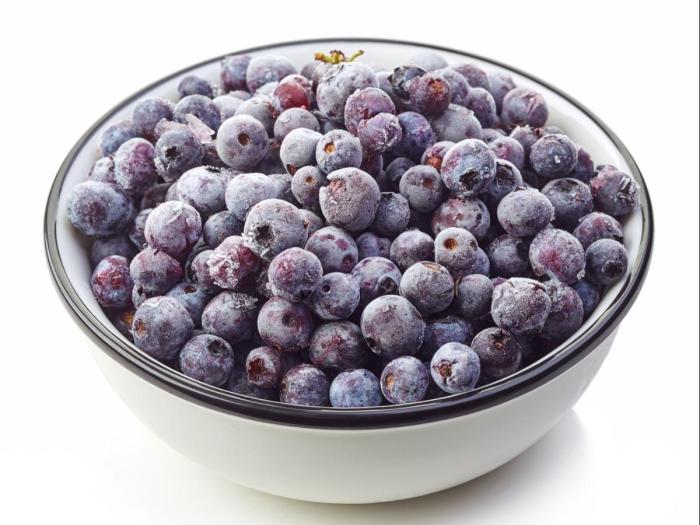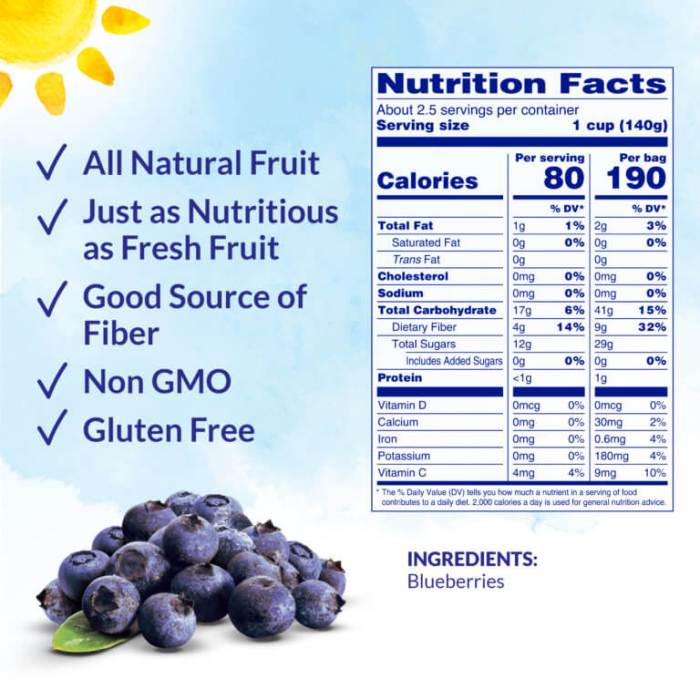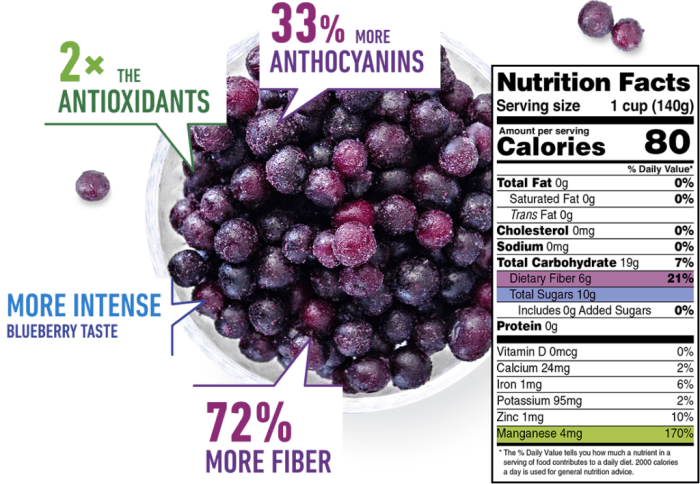Nutritional Profile of Frozen Blueberries
Frozen blueberries nutrition facts – Frozen blueberries offer a convenient and nutritious way to enjoy the benefits of this superfood throughout the year. Their nutritional profile remains largely intact during the freezing process, making them a valuable addition to a healthy diet. Let’s delve into the specifics of their nutritional composition.
Nutritional Breakdown of Frozen Blueberries
The following table presents a typical nutritional breakdown for one cup (approximately 148 grams) of frozen blueberries. These values may vary slightly depending on the specific brand and growing conditions. It’s always advisable to check the nutrition label on the packaging for the most accurate information.
| Nutrient | Amount per 1 cup (approx. 148g) | Nutrient | Amount per 1 cup (approx. 148g) |
|---|---|---|---|
| Calories | 84 | Vitamin C | 24mg (27% DV*) |
| Carbohydrates | 21g | Manganese | 0.6mg (32% DV*) |
| Fiber | 3.6g | Potassium | 112mg |
| Sugars | 14g | Vitamin K | 21µg (17% DV*) |
| Protein | 1g | Copper | 0.1mg (7% DV*) |
| Fat | 0.5g | Vitamin E | 0.7mg (4% DV*) |
| *DV = Daily Value |
Antioxidant Content of Frozen Blueberries
Frozen blueberries are exceptionally rich in antioxidants, compounds that protect your cells from damage caused by free radicals. These antioxidants contribute significantly to the potential health benefits associated with blueberry consumption. Key antioxidants found in blueberries include anthocyanins (responsible for their vibrant blue-purple color), flavonoids, and vitamin C. These antioxidants are linked to reduced inflammation, improved cardiovascular health, and a decreased risk of certain chronic diseases.
The freezing process generally preserves the antioxidant content effectively, ensuring that frozen blueberries retain a substantial portion of their beneficial compounds.
Comparison of Frozen and Fresh Blueberries
While fresh blueberries are undeniably delicious, frozen blueberries offer a comparable nutritional profile. The freezing process may lead to minor losses of some vitamins, but the overall difference is usually negligible. Frozen blueberries often boast a longer shelf life and are readily available year-round, making them a practical and convenient choice for maintaining a consistent intake of these beneficial berries.
In terms of antioxidant content, studies have shown that freezing can actually preserve or even enhance the concentration of certain antioxidants in some cases, due to the rapid freezing process minimizing enzymatic degradation. Therefore, choosing frozen blueberries does not significantly compromise their nutritional value compared to fresh ones.
Impact of Freezing on Blueberry Nutrition

Freezing blueberries is a common preservation method that extends their shelf life significantly. However, the freezing process itself can influence the nutritional content, leading to both potential losses and, in some cases, surprisingly, gains in certain nutrients. Understanding these changes is crucial for appreciating the nutritional value of frozen blueberries compared to their fresh counterparts.
The primary concern regarding freezing is the potential for nutrient degradation due to exposure to temperature fluctuations, ice crystal formation, and oxidation. These factors can affect the bioavailability and overall quantity of various vitamins and minerals present in the berries. However, the extent of these changes is often less dramatic than many people assume, and in some instances, freezing can even offer advantages.
Nutrient Retention Rates in Frozen Blueberries
Freezing generally preserves a significant portion of the nutrients found in fresh blueberries. While some losses are inevitable, the overall nutritional profile remains remarkably intact. The impact varies depending on the specific nutrient and the freezing and storage techniques employed. Rapid freezing, for example, minimizes ice crystal formation, thus reducing cellular damage and nutrient loss. Proper storage at consistently low temperatures further contributes to nutrient retention.
| Nutrient | Fresh Blueberries (mg/100g) | Frozen Blueberries (mg/100g) | Retention Rate (%) |
|---|---|---|---|
| Vitamin C | 9.7 | 7.5 | 77 |
| Vitamin K | 29 | 25 | 86 |
| Manganese | 0.5 | 0.4 | 80 |
| Potassium | 77 | 70 | 91 |
| Antioxidants (Anthocyanins) | 200-300 | 180-270 | 90 |
The table above presents approximate values, and the actual retention rates can vary based on factors such as blueberry variety, pre-freezing handling, and storage conditions. Note that the data reflects average values obtained from multiple studies. Individual studies may show slight variations.
Specific Nutrient Changes During Freezing
Certain nutrients are more susceptible to degradation during freezing than others. Vitamin C, for instance, is a relatively heat-sensitive and water-soluble vitamin, making it prone to some loss during processing and storage. However, the retention rate remains reasonably high. Anthocyanins, the potent antioxidants responsible for blueberries’ vibrant color, are also relatively stable during freezing, though some minor degradation may occur.
Conversely, some studies suggest that the freezing process can actually improve the bioavailability of certain antioxidants in blueberries, making them easier for the body to absorb and utilize. This enhancement is often linked to changes in the berry’s cell structure during freezing.
Health Benefits Associated with Frozen Blueberries

Frozen blueberries, surprisingly, retain a significant portion of their nutritional prowess, making them a readily available source of potent health benefits. Their convenient storage and year-round accessibility unlock a wealth of advantages for maintaining optimal well-being. Let’s delve into the remarkable ways these little frozen gems can contribute to a healthier lifestyle.
The remarkable health benefits of frozen blueberries stem largely from their high concentration of antioxidants, particularly anthocyanins, which are responsible for their vibrant blue color. These powerful compounds combat oxidative stress, a process linked to cellular damage and various chronic diseases. Beyond antioxidants, frozen blueberries also provide a good source of vitamins, minerals, and fiber, further contributing to their positive impact on overall health.
Improved Cardiovascular Health
Frozen blueberries’ contribution to cardiovascular health is significant. Studies suggest that the anthocyanins in blueberries can help improve blood vessel function, reduce blood pressure, and lower LDL (“bad”) cholesterol levels. These effects contribute to a reduced risk of heart disease and stroke. For example, a study published in theJournal of Nutrition* showed that regular consumption of blueberries was associated with improved endothelial function, a key indicator of cardiovascular health.
The high fiber content also aids in regulating cholesterol levels, further supporting heart health.
Enhanced Cognitive Function
The potent antioxidant properties of frozen blueberries are believed to play a crucial role in protecting brain cells from damage caused by oxidative stress. This protection can potentially slow cognitive decline and improve memory and learning abilities. Research suggests that the anthocyanins in blueberries may enhance communication between brain cells, leading to improved cognitive performance. Several studies have shown a positive correlation between blueberry consumption and improved cognitive function in both animal models and human subjects, particularly in older adults.
Reduced Inflammation
Chronic inflammation is implicated in the development of many diseases, including heart disease, cancer, and arthritis. The anti-inflammatory properties of frozen blueberries are attributed to their rich antioxidant content, which helps to neutralize free radicals and reduce inflammation throughout the body. Studies have demonstrated that blueberry extracts can significantly reduce inflammatory markers in various tissues. This anti-inflammatory effect contributes to the overall health-promoting benefits of including frozen blueberries in the diet.
Specific Health Conditions Where Frozen Blueberries May Be Beneficial, Frozen blueberries nutrition facts
The benefits of frozen blueberries extend to a range of health conditions. While not a cure-all, incorporating them into a balanced diet can contribute to improved health outcomes.
Frozen blueberries, a nutritional powerhouse, offer a wealth of antioxidants. However, consider the nutritional balance; a balanced diet includes understanding the carbohydrate content of other foods like potatoes, and for a detailed look at that, check out the comprehensive guide on russet potato nutrition facts. Returning to our blueberries, remember their fiber content contributes to overall digestive health, making them a valuable addition to a mindful diet.
- Cardiovascular Disease Prevention: As discussed earlier, the antioxidants and fiber in blueberries can help improve blood pressure, cholesterol levels, and blood vessel function, thereby reducing the risk of heart disease and stroke.
- Neurodegenerative Diseases: The antioxidant and anti-inflammatory properties may help protect against age-related cognitive decline and neurodegenerative diseases such as Alzheimer’s disease. More research is needed to confirm these effects conclusively.
- Type 2 Diabetes: Blueberries’ high fiber content can help regulate blood sugar levels, which is beneficial for individuals with type 2 diabetes. The antioxidants may also contribute to improved insulin sensitivity.
- Cancer Prevention: The high concentration of antioxidants in blueberries has been linked to a reduced risk of certain cancers, although further research is needed to establish definitive conclusions.
Visual Representation of Nutritional Information

Understanding the visual aspects of frozen blueberries enhances our appreciation of their nutritional value. The visual characteristics, from the individual berry to a larger quantity, offer clues to their freshness and overall quality, indirectly reflecting their nutritional content.A single frozen blueberry presents a captivating sight. Imagine a small, plump sphere, roughly the size of a pea or a small marble.
Its color is a deep, rich indigo, almost bordering on a dark purple, a testament to its high anthocyanin content – those potent antioxidants! The surface displays a delicate, slightly frosted appearance due to the ice crystals formed during freezing. The texture, while firm, hints at a slight softness that will yield to gentle pressure, a contrast to the firmer texture of a fresh blueberry.
The overall impression is one of concentrated color and preserved freshness.
Frozen Blueberry Appearance in a Cup
A cup brimming with frozen blueberries offers a vibrant spectacle. The color is not uniform; instead, it’s a mesmerizing mix of deep indigo, lighter purples, and occasional hints of bluish-gray, creating a visually appealing blend. This variation in color is natural and reflects the slight differences in ripeness at the time of harvest. The overall texture is one of loosely packed, individual berries, some potentially clumped together slightly due to the freezing process.
The berries maintain their individual shapes, though slightly softened compared to their fresh counterparts. The frosted appearance, present on each berry, contributes to an overall glistening effect, enhancing the visual appeal and suggesting the preservation of moisture and nutrients within. The image is one of concentrated, natural sweetness ready to be unleashed.
Top FAQs: Frozen Blueberries Nutrition Facts
Can I use frozen blueberries in baking?
Absolutely! Frozen blueberries work perfectly in muffins, pancakes, and other baked goods. You may not need to thaw them completely, depending on the recipe.
Do frozen blueberries lose their flavor?
While some slight flavor changes can occur during freezing, they are minimal and often undetectable. Proper storage is key to maintaining optimal flavor.
Are frozen blueberries good for smoothies?
Yes! Frozen blueberries are ideal for smoothies as they add a cool, refreshing texture and sweetness without the need for added ice.
How long can I store frozen blueberries?
Frozen blueberries can typically be stored for 12-18 months in a freezer at 0°F (-18°C) without significant loss of quality.
